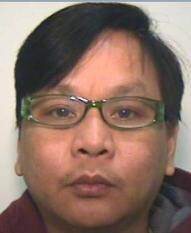Greater Manchester Police say it was one of the most complex investigations they’ve ever conducted, and the former regional head of the Crown Prosecution Service said it was like “Murder of the Orient Express with two hundred suspects”.
All in all it took two years to pull together a case against nurse Victorino Chua for the murder and poisoning of twenty one patients at Stockport’s Stepping Hill Hospital and the verdict yesterday has raised questions over the reliability of nursing qualifications issued in the Philippines.
First the facts. Forty nine year old Victorino Chua was found guilty of murdering two patients during a reign of terror at the Stepping Hill hospital where he worked after he had deliberately contaminated products that were stored on acute treatment wards with insulin.
The products, which included saline bags and ampoules, would then be used by unsuspecting staff members to treat unsuspecting patients. The insulin would cause them to suffer hypoglycaemia, a drop in blood sugar levels.
The effects of such poisoning vary drastically but can result in death and Chua was found guilty of the murders of Tracy Arden, and Alfred Derek Weaver, as well being found guilty of intentionally causing grievous bodily harm to one patient who suffered a brain injury as a result of being poisoned and for whom Chua falsified his medical records, recording him as being conscious and alert when blood tests have proven that he was suffering severe hypoglycaemia.
Chua was also found guilty of attempting to intentionally cause grievous bodily harm to twenty one other patients who became unwell after being treated with products contaminated with insulin but for who it could not be proven beyond all reasonable doubt suffered injury as a result or who suffered no lasting effects.
In the case of one of the patients, Chua was seen by staff to give a false reading by placing his own finger in a probe that records patient information.
A police investigation commenced in July 2011, the main lines of investigation included a review of hospital data, including point of care results, medical records and preserved blood samples, a review of the supply chain of effected products and an investigation into the shift patterns, backgrounds and working practices of hospital staff.
An arrest was made in July, that of Rebecca Leighton, dubbed the “angel of death” and subject to hostile media attention, she was charged in the same month but in December that year she was cleared of all charges after prosecutors admitted they had insufficient evidence.
Leighton is currently claiming aggravated damages from Greater Manchester police for breach of privacy and negligence.
While this was going on, according to police, Chua changed tact as he sought to poison other patients, again indirectly, in January 2012, by altering patients’ prescriptions. Alterations involved adding prescription only drugs or increasing the size or frequency of the dose.
One patient was actually administered a dose prior to the alterations being discovered and subsequently made a full recovery and in respect of these offences, he was found guilty of eight offences of unlawfully administering or causing to be taken by another person any poison or destructive or noxious thing with intent to injure, aggrieve or annoy, or attempting to do so after deliberately altering prescriptions.
Of all employees, including permanent, temporary and ‘bank’ staff, detectives established Chua was the only person on shift proximate to three key events. He was present when five patients were poisoned overnight between 10th and 11th July 2011; when contaminated ampoules were found overnight between 11th and 12th July 2011; and when prescription charts were fraudulently altered on 3 January 2012.
During a search of his house following his arrest, detectives recovered an autobiographical letter penned by Chua. In it he wrote, “I’m a nice person but there a devil in me…I’m evil at the same time angel,” and: “So I’m writing this letter in case something happen to me my family can continue my case or can tell somebody to look at it and work out how and angel turn to an evil person. The bitter nurse confession. Got lots to tell but I just take it to my grave.”
The case has outlined grave inadequacies in the checking of Chua’s records. He arrived from Manila in 2002 and was allowed to walk into NHS hospitals with only photocopied papers, and it was discovered he had been thrown off his degree course in Manila for selling prescription forms to patients.
It now turns out that that police were so concerned about people employed in the same way as Chua that they wrote to four government departments including the Department of Health and the Foreign Office. As this is being written the department of health have not yet commented.







